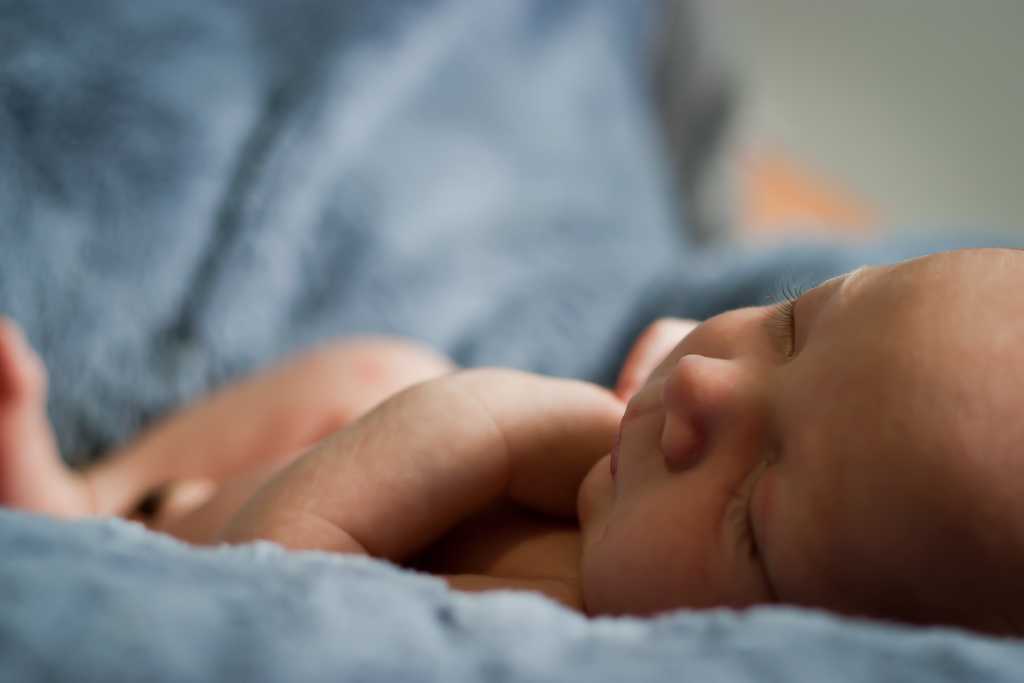Having a baby who sleeps a lot can make you the envy of your parent-friends, especially when they know you’re getting a good night’s sleep and they get woken up in the middle of the night, every night!
But if your baby is sleeping all of the time, it can understandably make you feel antsy and a little bit anxious that something might not be quite right.
To put your mind at ease, many parents are surprised when they find that their little one can sleep a great deal, but it’s actually a very common experience. Babies need to rest regularly and for long periods of time as growing up is tiring work!
All that napping, however, can interfere with development and so it’s important to ensure your sleepy baby isn’t missing out on feedings. There are also some medical implications of a baby sleeping too much which we’ll go into, further on in this article.
Can a Newborn Sleep Too Much? 5 Surprising Facts
How Much Should a Newborn Sleep?
You may be wondering how much sleep is normal for a newborn? Well, on average, they sleep for roughly 16 hours a day, but this can vary and sometimes approach 18 to 20 hours per day. And these periods of sleep typically occur for bursts of 30-45 minutes or stretches of 3-4 hours each time. (1)
This is quite a lot of sleep per day!
These short bouts of sleep occur in babies under their first 11-12 weeks of age because they have not yet developed a circadian rhythm at this stage. Instead, their sleeping pattern is dictated mostly by feeding times (2).
Even so, a babies sleeping pattern does continue to be erratic until they are at least 6 months old. It is at this age they start to develop a more rigid sleeping schedule but still sometimes waking for feedings.
- Breastfed newborns require 8-12 feedings per day
- Bottle fed newborns require 5-8 feedings per day
Additionally, babies get full quickly as they only have small stomachs. Whether you are breastfeeding or using formula milk, your baby may fall asleep during feeding as being snuggled close to mother makes them sleepy. This can result in them falling asleep before they are full only to need feeding again when they are awake.
This is why many parents find it extremely useful to have a co-sleeper bassinet next to their bed for the baby to sleep in. It allows you easy access to your baby when they wake up during the night for feeding, after which they usually slip right back to sleep.
When a baby sleeps too much, the issue is not that they’re getting too much sleep, the concern is usually that they may be missing out on regular feedings; vital nutrients for their growth and development.
Should You Wake a Sleeping Baby to Feed?

When a baby reaches one month old, on average, they tend to put on 1 pound over their birth weight. They then continue to put on 1 pound each month until they reach six months old. By this time, most babies will have doubled their birth weight and weight gain starts to slow down.
As your baby grows during their first two weeks of age, you would expect them to gain weight at a healthy pace. If this is the case and your pediatrician consents, there would be no need to wake your baby for feeding.
However, if they are not gaining the expected weight for their size and age, consult your pediatrician and they will most likely agree that you’ll need to wake up your baby so that you can feed them more often.
How to Wake Up a Baby from a Nap
It’s fantastic that your child is a dedicated snoozer who loves a good sleep, you’ll make any parent jealous. It’s just that sometimes they would rather stay asleep than wake up for a meal, and this is when they’ll need to be woken up if they are not gaining the expected weight.
Waking a peacefully sleeping baby may seem somewhat out of line and you might feel bad about doing it but you might also run into trouble. They sometimes do not take kindly to being woken or your baby might be hard to wake up, so here are some of our tips to help it go smoothly:
Placing them on a Firm Surface
Taking them away from the comforts of your arms, or a sleeper and placing them onto a play mat will make them feel a little less secure. This is likely to rouse them from their sleep ready for a feed.
Unwrapping Their Swaddle
In the same principle as the last, removing them from the snugness, warmth, and safety of a swaddle is an effective way of gently rousing them from sleep. The cooler air will likely stir them, and you can even take some of their clothes off to help.
Change Their Diaper
If they need a diaper change then it’s an effective way to wake them up feeling refreshed. The cool wet wipe on their backside will help out a lot.
Blow in Their Face
Blow very gently into their face which may not impress them very much, but it’s an effective way to wake them up without shocking them too much.
Give them a Bath
It’s well known that applying water to a sleeping person will jolt them awake but give baby a sponge bath with nice lukewarm water and they will surely waken.
Tickle Their Back
Very gently, with no pressure at all, run your fingers up and down the baby’s spine. This will alert them enough to wake up.
Sleepy Baby: When to Worry?
Given the fact that it’s pretty normal for a newborn baby to sleep most of the day away, apart from the few hours they’re awake to feed, are there any reasons to worry about your baby sleeping too much other than that they’re missing out on food?
There are medical conditions that cause the baby to sleep too much as a symptom so here are some things to look out for and raise with your pediatrician if you spot several symptoms occurring:
Neonatal Jaundice
Jaundice is a condition in which the liver fails to break down a substance in the body called bilirubin which then builds up in the blood. This substance is the remainders of red blood cells which are broken down as part of a natural bodily process.
Bilirubin is yellow in color which is why you’ll notice a major symptom of jaundice which is a yellow tint to the skin, particularly on the palms of the hands and soles of the feet.
Neonatal jaundice occurs in newborn babies. It’s quite a common and often harmless condition which passes naturally. Babies that develop it, usually do approximately 2-3 days after birth and it clears up when they reach about two weeks old. (3)
Pay attention to the color of your baby’s urine which will appear as dark yellow when a newborns urine is supposed to be clear. And their stools which will appear pale in color as opposed to mustard yellow or orange.
Rarely, jaundice can be an indicator of other underlying health conditions, and some complications can also occur. If you are worried that your child does have neonatal jaundice, make sure to seek medical advice from your pediatrician.
High Body Temperature
A baby wanting to sleep too much is also a sign of heat exhaustion or a heat stroke and this doesn’t just occur in hot weather. This can happen when mom or dad wraps the baby in too many blankets or swaddles too tightly.
Check your baby’s temperature with a thermometer and make sure they are not over 38 degrees Celsius (100.4 degrees Fahrenheit). If they are, take steps to cool them down by removing blankets and clothes and take them into a cooler room. (4)
If they are consistently at a high temperature for 30 minutes or more, then this is a sure sign of heat stroke, a medical emergency, and you should call 911 immediately!
Struggles to Stay Awake
If your baby doesn’t seem to be able to keep themselves awake for the few hours that they are a day, they may also seem lethargic and unable to stay alert.
This is an indication of a medical problem and you should consult a medical consultant such as your pediatrician about this. There could be many reasons as to why this is occurring and so tests may need to be undertaken to find out what the problem is if there is one.
Baby Sleeping Too Much Suddenly

If your baby is a week or two weeks old and has only just started sleeping a lot more than usual, there can be different reasons for this.
Growth Spurt
Growth spurts are often the prime reason why a baby will be sleeping more than they did before. They do most of their growing and their physical and mental development while they are asleep after all.
Up until 6 months old, a baby will undergo many growth spurts and even though each child differs, here are some ages that growth spurts occur on average so that you know what to expect:
- 7-10 Days Old
- 2 Weeks Old
- 4 Weeks Old
- 8 Weeks Old
- 12 Weeks Old
- 4 Months Old
- 6 Months Old
Teething
Finally, another reason that a baby will sleep more often for longer is that they are pushing through new teeth. Sometimes teething can interrupt a baby’s sleep as it can be painful but others sleep more than usual!
Most tend to think that teething would feel something like a toothache, but in reality, it feels a lot more like a cold, with fevers and high mucus production. Sleeping is a way of fighting these symptoms off.
Other symptoms of teething include:
- Increased Saliva and Drooling
- Redness of the gums
- Flushed Cheeks
- Biting and putting hands in mouth
- Crying / crankiness
In Summary
If your baby is sleeping a lot, especially as a newborn, more often than not there is nothing to worry about and it’s completely normal. They just sleep more than you expected them to.
There is, of course, the possibility of neonatal jaundice and heat stroke to look out for but make sure to keep calm, consult your pediatrician about any worries or symptoms you notice and take your child’s temperature, especially when they’re being swaddled.
When it comes to growth spurts and teething, the baby sleeping more is actually a good sign, it means they are growing and developing normally and there is nothing to worry about.
Just be happy you have a good sleeper and enjoy the peace and quiet when you can!
References
- https://www.ncbi.nlm.nih.gov/pmc/articles/PMC1201415/
- https://www.ncbi.nlm.nih.gov/pmc/articles/PMC5440010/
- https://www.nhs.uk/conditions/jaundice-newborn/
- https://www.nhs.uk/conditions/pregnancy-and-baby/how-to-take-your-babys-temperature/